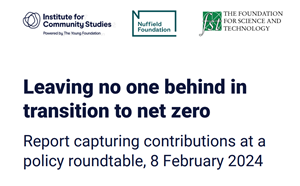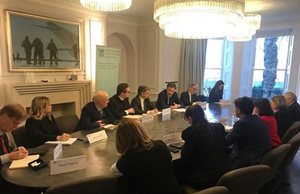EVENTS
The Foundation organises events on key topics in science, research, technology or innovation, bringing together parliamentarians, civil servants, industrialists, researchers, learned societies, charities and others. Those events focus in particular on areas where there are policy decisions needed, which in turn need to be informed by this wide range of inputs and viewpoints. Summary reports are prepared for all events, and these - along with presentation slides, videos of speakers and audio files - are available online after events.
Filter: Year 2024
Empowerment and Ethics at the Edge: the Benefits and Risks of Edge Technologies

- 2024
- Debate, Discussion
- The Royal Society and online
The shift towards citizen-centric edge technologies like AI enhances lives like never before. From personalized adviser apps on smartphones to applications in personalised medicine, these edge technologies promise transformative potential, but with those benefits come new threats and risks. Organised in collaboration with The PETRAS National Centre of Excellence, this event will explore how technologies at the edge can revolutionise citizens’ experiences, while ensuring ethical and security considerations remain at the forefront. The discussion will illuminate the benefits and risks of this technological evolution, and how to ensure a balanced perspective that prioritises the well-being of citizens. We hope that you can join us to explore the gradual migration of AI to the Edge and its profound implications for society.
Read MoreThe UK Fusion Programme

- 2024
- Debate, Discussion
- The Royal Society and online
It’s a time of change for the UK fusion programme. The JET (Joint European Torus) facility in Culham, funded as part of the Euratom programme, came to an end in December 2023, after 40 years at the cutting edge of global fusion research. The Euratom partners are focussing on the International Thermonuclear Experimental Reactor (ITER) in southern France, though the start up for that is not until in the mid-2030s. Meanwhile, the UK decided not to rejoin Euratom at the same time that it rejoined Horizon Europe, in September 2023. On the commercial side, the UK is producing a number of small, high-tech fusion technology companies looking to work with fusion research facilities globally, and the UK Atomic Energy Authority has announced plans for STEP (Spherical Tokomak for Energy Production), a prototype fusion power plant to be built in Nottinghamshire. Where do these changes leave UK fusion? How can we ensure that the UK maintains its position in global fusion activities – in both research and commercialisation – in this changing environment, and outside of the Euratom programme? What are the UK’s key priorities for the coming years? These are some of the questions discussed at this event.
Read MoreCan Artificial Intelligence be regulated and if so how?

- 2024
- Debate, Discussion
- The Royal Society and online
Governments and regulators across the globe are considering the rapid changes which are being brought about by artificial intelligence, the huge potential benefits it can bring, but also the significant potential harms. The EU AI Act is the new European regulatory framework in the EU, with the USA and other major economies discussing similar issues, and with much discussion at the UN and OECD amongst others. In the UK, some aspects of AI are included in the new online safety bill, and the UK was also the host in November 2023 of the first global AI Safety Summit. In this event, we discussed the different challenges of regulating AI and how different jurisdictions were approaching that challenge.
Read MoreA Roundtable: Leaving no one behind in the transition to net zero

- 2024
- Discussion
The Foundation for Science and Technology (FST), with The Young Foundation’s Institute for Community Studies, brought together a cross departmental and cross-sector group of thought leaders and policymakers to focus on the human and community side of the UK’s transition to net zero. The roundtable was prompted by the FST’s event in November 2023 charting progress to date on net zero transition in the UK policy, science and innovation context, which identified that a gap exists in terms of policy interventions; public strategies; and holistic, person-centred research into the design of household and community policies to build a just transition to net zero.
Read MoreScaling up deep technology companies in the UK – challenges and solutions

- 2024
- The Royal Society and online
The UK is a highly innovative nation, with a great reputation for small deeptech startups, often emerging from the UK university sector. For the most promising of those organisations, seed funding can be found in the UK, but scaling up these companies, and sourcing the funds to enable that to happen, can be a real challenge. This limits the value to UK plc, as these companies have the potential to provide huge returns to the economy, but with longer timescales than startups in other sectors, with a need for patient capital investment. How big is this problem, in comparison with our key competitors? And what are the roles of the universities, venture capital firms, UKRI and its agencies, central government and the companies themselves to help address them? These are some of the issues discussed in this evening discussion event.
Read MoreA Roundtable on Artificial Intelligence

- 2024
- Discussion
A selection of thought leaders discussed AI regulation, particularly generative AI. Attendees first heard from four participants who gave initial thoughts including global and UK perspectives view, how to harness AI’s capabilities, and its substantial risks such as misinformation. This was followed by a discussion which included whether and how to “guard rail” AI, standardisation and codes of conduct. Other issues discussed included regulatory choices, standardisation, speed, lingo and fairness, and where the UK fits into the emerging global picture.
Read More